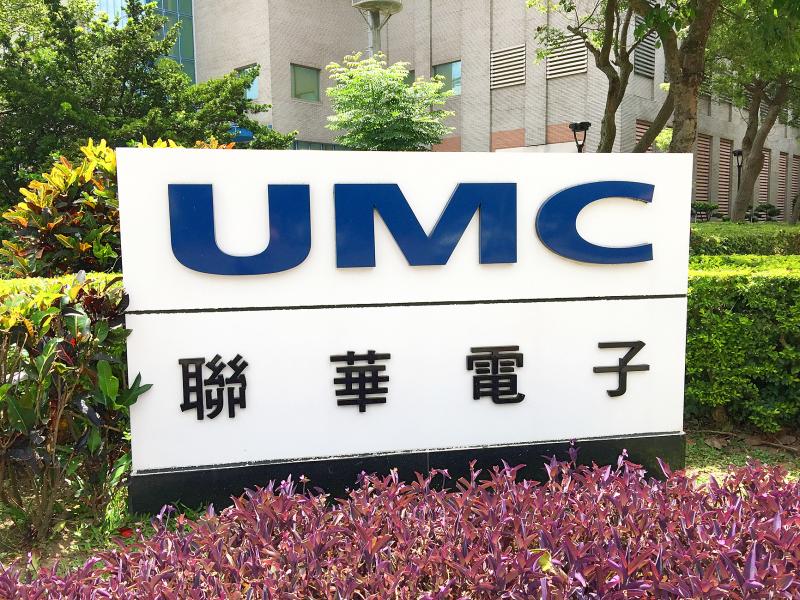United Microelectronics Corp (UMC, 聯電), the world’s No. 3 contract chipmaker, yesterday said that its board of directors has approved a plan to pay a cash dividend of NT$1.6 per share this year, up from NT$0.75 last year and the highest in 21 years.
Based on the plan, UMC would pay NT$19.88 billion (US$702.32 million) in cash dividends to shareholders this year.
The payout ratio was about 66 percent, as the company earned NT$2.42 per share last year.

Photo: Grace Hung, Taipei Times
The planned dividend represents a yield of 2.93 percent, based on the stock’s closing price of NT$54.7 yesterday.
The payout plan is subject to shareholders’ approval at the company’s annual general meeting on June 8, UMC said.
The board of directors also approved a capital appropriation plan of NT$6.23 billion, which UMC would use for capacity expansion, the Hsinchu-based chipmaker said, without providing further details.
Last month, UMC told investors that it was raising capital expenditure to US$1.5 billion to expand capacity, as a supply crunch is expected to persist.
Smartphone and work-from-home-related demand remained strong, while a pickup in automotive chips was adding to an already tight supply of chips, it said.
The board approved a plan to raise funds via an issuance of 1.38 billion new common shares.
UMC is seeking a strategic and technological alliance with potential investors at home and abroad through a private placement, the company said.
Separately, Delta Electronics Co (台達電) said that its board of directors approved a plan to pay a cash dividend of NT$5.5 per share this year, a filing with the Taiwan Stock Exchange showed.
The planned cash dividend represents a payout ratio of 56.07 percent, based on the company’s earnings per share of NT$9.81 last year.
Delta, the nation’s leading power and thermal solutions provider, last year distributed a cash dividend of NT$5 per share to shareholders.
The proposed payout for this year is subject to shareholders’ approval at the company’s annual general meeting on June 11 in Taoyuan, it said.
Additional reporting by Angelica Oung

Intel Corp chief executive officer Lip-Bu Tan (陳立武) is expected to meet with Taiwanese suppliers next month in conjunction with the opening of the Computex Taipei trade show, supply chain sources said on Monday. The visit, the first for Tan to Taiwan since assuming his new post last month, would be aimed at enhancing Intel’s ties with suppliers in Taiwan as he attempts to help turn around the struggling US chipmaker, the sources said. Tan is to hold a banquet to celebrate Intel’s 40-year presence in Taiwan before Computex opens on May 20 and invite dozens of Taiwanese suppliers to exchange views

Application-specific integrated circuit designer Faraday Technology Corp (智原) yesterday said that although revenue this quarter would decline 30 percent from last quarter, it retained its full-year forecast of revenue growth of 100 percent. The company attributed the quarterly drop to a slowdown in customers’ production of chips using Faraday’s advanced packaging technology. The company is still confident about its revenue growth this year, given its strong “design-win” — or the projects it won to help customers design their chips, Faraday president Steve Wang (王國雍) told an online earnings conference. “The design-win this year is better than we expected. We believe we will win

Chizuko Kimura has become the first female sushi chef in the world to win a Michelin star, fulfilling a promise she made to her dying husband to continue his legacy. The 54-year-old Japanese chef regained the Michelin star her late husband, Shunei Kimura, won three years ago for their Sushi Shunei restaurant in Paris. For Shunei Kimura, the star was a dream come true. However, the joy was short-lived. He died from cancer just three months later in June 2022. He was 65. The following year, the restaurant in the heart of Montmartre lost its star rating. Chizuko Kimura insisted that the new star is still down

While China’s leaders use their economic and political might to fight US President Donald Trump’s trade war “to the end,” its army of social media soldiers are embarking on a more humorous campaign online. Trump’s tariff blitz has seen Washington and Beijing impose eye-watering duties on imports from the other, fanning a standoff between the economic superpowers that has sparked global recession fears and sent markets into a tailspin. Trump says his policy is a response to years of being “ripped off” by other countries and aims to bring manufacturing to the US, forcing companies to employ US workers. However, China’s online warriors